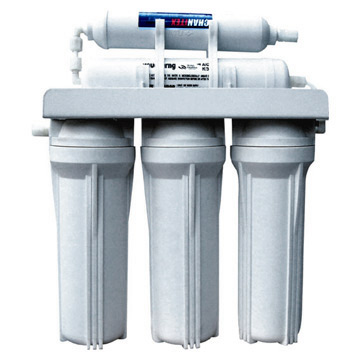Welcome to the world of softer water!
Say goodbye to the pesky problems caused by hard water and embrace the benefits of a domestic water softener. At Right Plumber, we specialize in providing top-notch water softening solutions for your home. We can resolve hard water problems including limescale and sediment build up, to bitter tastes or chlorine odours.
Let us introduce you to the wonders of soft water and show you how our installation services can transform your daily life.
The are several different methods of water treatment systems available:
|
|
Below are the most common methods available to improve the quality of drinking water.
These systems may be used alone or in combination.
Carbon Filtration:
Carbon water filtration is a method of purifying water that uses activated carbon to remove impurities and improve its taste and odor.
Activated carbon, also known as activated charcoal, is a highly porous substance with a large surface area that can adsorb contaminants from water.
The process of carbon water filtration typically involves passing water through a filter medium containing activated carbon. As water flows through the carbon filter, impurities and substances such as chlorine, volatile organic compounds (VOCs), pesticides, herbicides, and some heavy metals are adsorbed onto the carbon surface.
This helps to improve the overall taste, odor and clarity of drinking water.
It is a recognized treatment technique for removal of certain organic contaminants such as trihalomethanes, trichlorethylene, paradichlorobenzene and others.
However, carbon will not remove total dissolved mineral salts from water alone.
Carbon filters can be used in various water filtration systems, including pitcher filters, faucet-mounted filters, countertop filters, under-sink filters, and whole-house filtration systems.
They are commonly used in both residential and commercial settings to treat tap water, making it safer and more pleasant to drink.
Ion-exchange Demineralization:
Ion-exchange demineralization, also known as deionization, is a water treatment process that removes almost all dissolved minerals and ions from water.
The ion-exchange demineralization process consists of two stages: Cation exchange and Anion exchange.
The result is highly purified water with a very low concentration of dissolved minerals and ions, often referred to as deionized water or demineralized water.
It’s important to note that ion-exchange demineralization does not remove non-ionic contaminants, such as certain organic compounds or bacteria.
Ion-exchange Softening:
Ion-exchange softening is a water treatment process that is commonly used to remove hardness minerals from water.
Hardness in water is primarily caused by the presence of calcium and magnesium ions, which can lead to scaling in pipes, appliances, and other water-using equipment.
A typical process of Ion-exchange softening is:
- Pretreatment
- Softening
- Regeneration
- Rinse
The ion-exchange softening process effectively reduces the hardness of water, preventing scale formation and improving the performance and lifespan of plumbing systems and water-using appliances. It is commonly used in residential, commercial, and industrial settings to provide a more desirable water quality for various applications.
Iron or Oxidizing Filtration:
Iron filtration and oxidizing filtration are two different methods used to remove iron from water. Let’s explore each method in more detail:
Iron Filtration: Iron filtration involves the use of a specialized filter media to trap and remove iron from water. This method is commonly used when dealing with high levels of dissolved iron in water. The filter media typically contains an active ingredient, such as manganese dioxide or zeolite, which acts as a catalyst to promote the oxidation of iron.
When water passes through the iron filter, the iron ions present in the water come into contact with the catalyst, which causes them to undergo oxidation. The oxidized iron particles then become larger and form solid particles. These solid particles are then trapped by the filter media, preventing them from passing through and thus removing iron from the water.
Oxidizing Filtration: Oxidizing filtration, on the other hand, is a broader term that refers to the process of using an oxidizing agent to convert dissolved or soluble contaminants into solid particles that can be filtered out. While iron removal can be achieved through oxidizing filtration, it is not limited to iron removal alone.
In the case of iron removal, an oxidizing agent such as chlorine or potassium permanganate is added to the water. The oxidizing agent reacts with the iron present, converting it from a dissolved form to a solid form. Once the iron has been oxidized, it can be filtered out using a filtration system such as a sediment filter or activated carbon filter.
It’s worth noting that oxidizing filtration may be used for other purposes as well, such as removing other metals, organic compounds, or even certain microorganisms from water.
Electronic Filtration:
Electronic water filtration is a process of purifying water using electronic devices or systems. Unlike traditional water filtration methods that rely on physical filters or chemical processes, electronic water filtration utilizes electrochemical or electromagnetic principles to remove contaminants from water.
Here are a few common types of electronic water filtration systems available:
Electrodeionization (EDI): This method uses an electric field to remove ions from the water. It combines ion exchange resins with ion-selective membranes to separate impurities from the water. EDI systems are often used in industrial settings for high-purity water production.
Electrodialysis (ED): Electrodialysis employs an electric field to selectively move ions through ion-exchange membranes, separating them from the water. It is effective in removing charged particles, such as salts and minerals.
Ultraviolet (UV) Disinfection: UV water filters use ultraviolet light to kill or deactivate bacteria, viruses, and other microorganisms present in the water. The UV light damages the DNA of these microorganisms, rendering them harmless. UV disinfection is commonly used as a final step in water treatment systems.
Electromagnetic Filtration: This method utilizes magnetic or electromagnetic fields to treat water. Magnetic water treatment devices claim to reduce the effects of hard water by altering the properties of dissolved minerals. However, the effectiveness of these devices in terms of water treatment remains a subject of debate.
It’s important to note that electronic water filtration systems may be used in combination with other filtration methods, such as activated carbon filters or reverse osmosis, to achieve comprehensive water purification.
When considering an electronic water filtration system, it’s crucial to understand its specific capabilities, maintenance requirements, and certification standards to ensure it meets your water treatment needs. Consulting with a water treatment specialist or referring to reputable sources is recommended before making a purchase or implementing such a system
Sediment Filtration:
Sediment Filtration removes suspended particles from the water to improve its appearance and it protects household devices that use water.
Reverse Osmosis (RO):
Reverse osmosis uses household pressure to separate water from dissolved mineral salts.
The filtered water enters a holding tank for use through a special faucet on the sink.
Reverse osmosis systems utilize a sediment filter, a semipermeable membrane, and a carbon filter to produce a low-mineral, low-sodium, good tasting drinking water.
Reverse osmosis is used by many bottled water companies to produce their high-quality product.
Softened Water:
Water hardness is demonstrated by scale in water heaters or on plumbing fixtures, by soap deposits on dishes and fabrics, and by soap scum in sinks and bathtubs.
Water can become “hard” as water passes through the atmosphere in the form of rain, snow, sleet, hail, dew, or fog, it picks up minerals along with gaseous and bacterial impurities. And, because water is the universal solvent, it picks up even more impurities in ponds, lakes, and rivers, as it percolates into the underground water table. Water hardness is measured in grains per gallon (gpg).
Water can be softened with detergents, chemicals or other compounds that can be very expensive. The most commonly used method is ion exchange softening which is relatively inexpensive and provides the luxury of using more natural types of cleaning products for household chores and personal care.
It is to your benefit, as a consumer, that all your water-using appliances are operating as efficiently as possible.
We are here to discuss a free no obligation way to increase your water efficiency.
We know that some areas of the Costa Blanca have notoriously hard water, amplified in some areas set a little further back from the coast.
Right Plumber clients in the areas of Jalon, Orba, Alcalali, Altea, Senija, Calpe, Moraira, Javea, Denia, Pego, Oliva and many more towns situated on the Costa Blanca have all benefited from a Right Plumber water treating solution and you could too.

